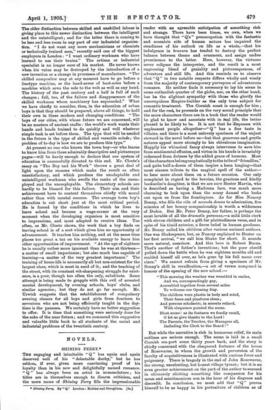THE engaging and inimitable " Q " has again and
again deserved well of his "delectable duchy," but he has seldom, if ever, given more convincing proof of his loyalty than in his new and delightfully named romance. " Q " has always been an artist in nomenclature ; his titles are in themselves enough to disarm criticism, and the mere name of Shining Ferry fills the impressionable Shining Ferry. By "Q." Londcon ; liothker and Stoughton. [62.] reader with an agreeable anticipation of something rich and strange. There have been times, we own, when we have thought that " Q's " preoccupation with the fantastic and eccentric side of human nature has impaired the steadiness of his outlook on life as a whole,—that his indulgence in bravura has tended to destroy the perfect balance between theme and ornament, and assign undue prominence to the latter. Here, however, the virtuoso never eclipses the interpreter, and the result is a most engrossing blend of geniality and picturesqueness, of adventure and still life. And this reminds us to observe that " Q " in two notable respects differs wholly and wisely from the majority of contemporary purveyors of adventurous romance. He neither finds it necessary to lay his scene in some outlandish quarter of the globe, nor, on the other hand, has he the slightest sympathy with those who glorify the unscrupulous Empire-builder as the only true subject for romantic treatment. The Cornish coast is enough for him ; and for the rest, he proceeds on the very sound principle that the more characters there are in a book that the reader would be glad to know and associate with in real life, the better pleased is he likely to be. It is not that he dispenses with unpleasant people altogether—" Q" has a fine taste in villains, and there is a most unlovely specimen of the unjust steward in the novel before us—but that generous and gentle natures appeal more strongly to his chivalrous imagination. Happily his whimsical fancy always intervenes to save him from sentimental effusion, and virtue in his hands is invariably redeemed from dulness by the added grace of humour. Most of the characters belong emphatically to the tribe of "friendlies," and quite half-a-dozen of them inspire a keen longing—that most sincere tribute to the magical spell of the author—. to hear more about them on a future occasion. Our only complaint in regard to the heroine, the gracious and kindly bookseller's daughter, is that we are sure Hester Marvin, who is described as having a Madonna face, was much more charming to look upon than the sonsy damsel who looks out upon us from the frontispiece. As for Miss Nuncey Benny, who fills the role of soconda donna to admiration, five minutes of her breezy companionship is worth a wilderness of Dodos. But Mr. Peter Benny, her father, is perhaps the most lovable of all the dramatis persona,e,—a mild little clerk with eleven children and a gift for platitudinous verse, and in spite of his timid exterior, a fierce belief in human goodness. Mr. Benny called his children after various eminent authors. One was Shakespeare, but, as Nuncey explained to Hester on her first arrival, "we call him Shake for short. It sounds more natural, somehow. And this here is Robert Burns. That's another of father's inventions; but the poor cheeld pulled down the kettle when he was eighteen months old and scalded hisself all over, so he's gone by his full name ever since." We cannot refrain from giving a specimen of Mr. Benny's skill in versification,—a set of verses composed in honour of the opening of the new school :— "This morning the weather was wreathed in smiles,
And we, correspondingly gay, Assembled together from several miles To welcome our Opening Day.
The children were plastic in body and mind, Their faces and pinafores clean;
And persons scholastic, in accents refined,
With eloquence pointed the scene.
Blest scene! as its features we fondly recall,
0 let us give thanks to the Lord !
The Parents, the Teacher, the Managers all, Including the Clerk to the Board !"
But while the narrative is rich in humorous relief, its main outlines are serious enough. The scene is laid in a small Cornish sea-port some thirty years back, and the story is chiefly concerned with the chequered fortunes of the house of Rosewarne, in whom the growth and perversion of the faculty of acquisitiveness is illustrated with curious force and poignancy. There is tragedy in the end of John Rosewarne, the strong, unrelenting, but honest village tyrant ; but it is an even greater achievement on the part of the author to succeed in ultimately eliciting something like compassion for his mean and sanctimonious son in the hour of his disgrace and discredit. In conclusion, we must add that " Q " proves himself to be as happy in his portraiture of children as of
"grown-ups," the joys and sorrows of the little orphan Myra, and her blind brother Clem, being handled with a tenderness that is as wholesome as it is delicate.







































 Previous page
Previous page